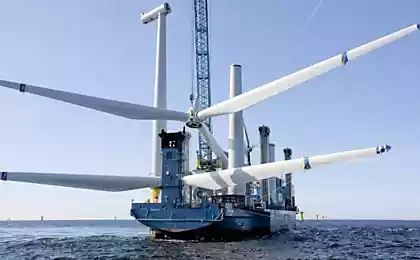436
Why fight for the climate is good for the economy

It argued that the struggle for a greener planet and a transition to renewable energy systems will have a negative impact on economic growth of countries: first, coal and oil are often cheaper than more environmentally-friendly sources, and secondly, the reduction of their processing industries will mean increased unemployment. But these arguments may be false, writes Fortune, at least, that is stated in two recent studies.
The first, conducted by the Institute of political economy at the University of Massachusetts at Amherst (PERI) and the Center for American progress, points out that the United States could cut carbon pollution by 40% and create 2.7 million new jobs in "clean energy". According to the findings of researchers, it would reduce unemployment by 1.5%.
"Climate stabilization is not a wonderful fantasy, but an achievable goal," said PERI.
Scientists have calculated that annual investment of $200 billion (that's 1.2% of US GDP) to energy efficiency for 20 years will reduce the amount of the consumed energy by 30% compared to current levels, while increasing renewable energy production by 400%.

Another study with similar conclusions was published by the International Commission on the economy and climate, chaired by former President of Mexico, Felipe Calderon. According to the authors, the creation of clean energy systems do not require exorbitant investments and the "countries of any income level" will be able to achieve economic growth and simultaneous decrease of negative impacts on the environment.
According to the Commission, to improve the efficiency of transport and buildings the world needs to spend $8.8 trillion, another $4.7 trillion will need to deploy the actual "green" energy system. However, the low-carbon scenario will help you to save in other areas of the economy at $5.7 trillion on the mining and mineral processing, $3.4 trillion on the construction of more compact, energy efficient cities, and $0.3 trillion for electricity transmission. As a result, conclude the authors of the report, "with the right investments" reduction in the consumption of hydrocarbons will cost only 5% more expensive than the traditional spending of States on energy and will cost the planet $4.1 trillion, if the world will have time to make the necessary changes until 2030 (further – more).
"It is generally believed that fighting climate change could reduce economic growth and slow job creation and threatens the other order leaders. The purpose of the Commission was to see whether you can do both tasks, and our main conclusion: Yes, to economic growth, at the same time, coping with climate change, perhaps," says Calderon.
Reasonable analysts predict growth of demand for oil and coal in developing countries, and both researchers ' report noted that completely overhaul the system by which the world today is building and financing the energy sector will not be easy, but I think they might. And not as scary as you might think.
источник:slon.ru
Source: /users/1077






















